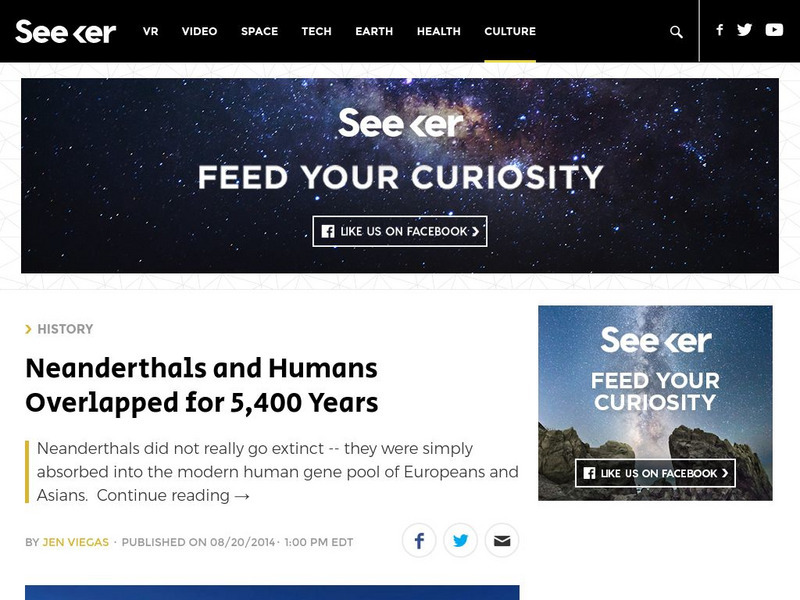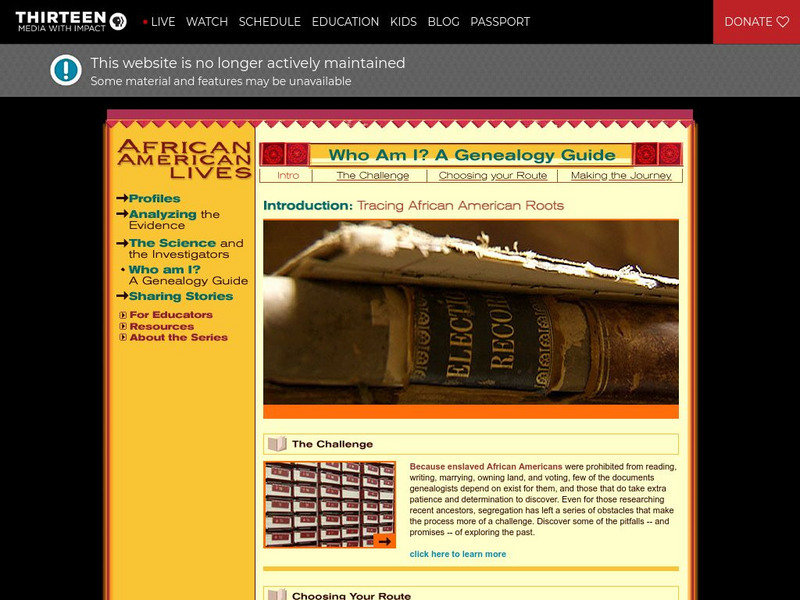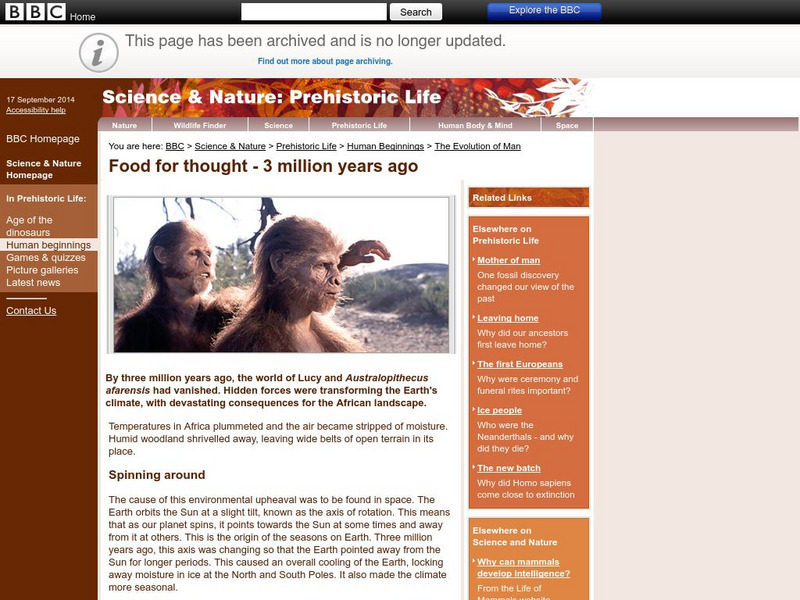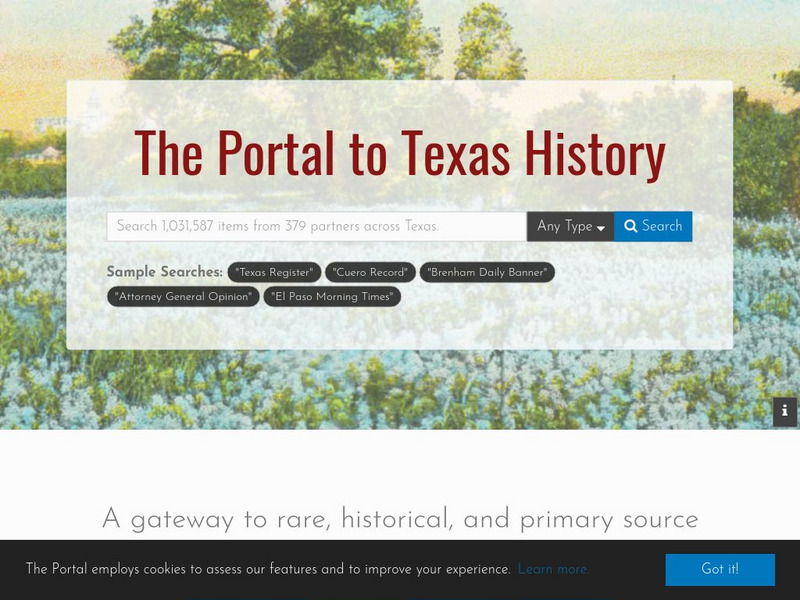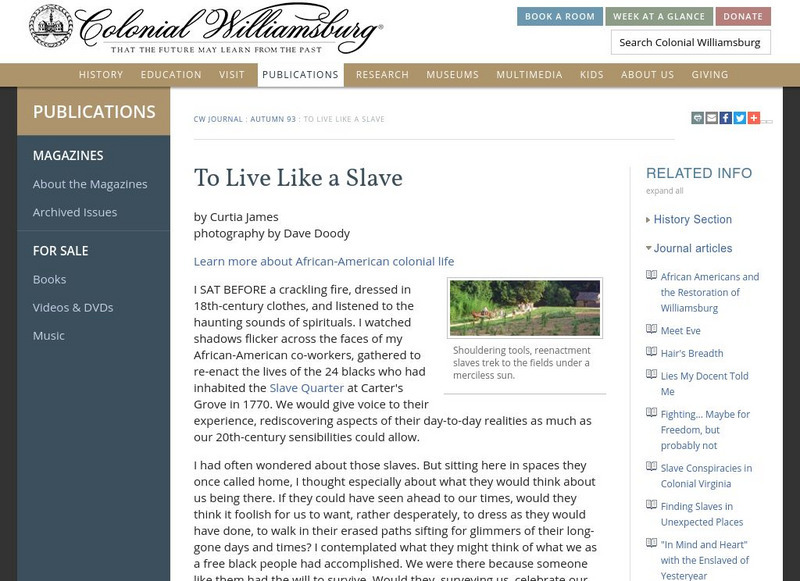Hi, what do you want to do?
Seeker
Seeker: Week of 8 25 14: Neanderthals, Humans Overlapped for 5,400 Years
Learn why recent discoveries are causing scientists to rewrite the timeline of modern humans and Neanderthals.
American Academy of Achievement
Academy of Achievement: Lee R. Berger, ph.d.
A biography of Lee Berger, a paleoanthropologist who made critical discoveries about our human ancestry during his explorations in Southern Africa. As he talks of his discoveries, you can feel his palpable excitement. Includes a profile,...
PBS
Wnet: Thirteen: African American Lives: Who Am I? A Genealogy Guide
Tracing African American history may be difficult, but the work of historian Henry Louis Gates proves that it isn't impossible. With this resource, learn how to plan a project on your family history.
BBC
Bbc: Week of 12 23 13: Neanderthals Could Speak Like Modern Humans
How do you imagine Neanderthals to have sounded? Have you ever considered that they might sound like you? Read this article to explore what a new study now says about the speaking capabilities of these creatures.
PBS
Pbs Learning Media: Genetic Variation
This video segment from NOVA: "Cracking the Code of Life" explores the genetic similarities and differences among organisms.
BBC
Bbc: Science and Nature: Three Million Years Ago
Take a trip back to three million years ago and learn about the different animals and their land that relate to the evolution of man. This article offers a look at the challenges and changes faced by our ancestors and suggests several...
Digital History
Digital History: Compensation for Slavery [Pdf]
Read the arguments for and against giving reparations to today's African Americans to atone for the slavery their ancestors endured in 18th and 19th century America. Also included are results from a poll conducted by the magazine, Black...
White Pine Pictures
White Pine Pictures: Sons and Daughters: The Italians of Schreiber
The community of Schreiber, Ontario has deep connections with the town of Siderno in Calabria, Italy as half its occupants have ancestors who came from there. This site describes the history of the town and the making of a television...
TED Talks
Ted: Ted Ed: Real Life Sunken Cities
Peter Campbell explains how sunken cities are studied by scientists to help us understand the lives of our ancestors, the dynamic nature of our planet, and the impact of each on the other. [4:31]
TED Talks
Ted: Ted Ed: The True Story of 'True'
The older the word, the longer (and more fascinating) the story. With roots in Old English, 'true' shares etymological ancestors with words like betroth and truce, but also with the word tree. In fact, trees have been metaphors for...
TED Talks
Ted: Ted Ed: The Scientific Origins of the Minotaur
The myth of the Minotaur tells the story of an enraged beast forever wandering the corridors of a damp labyrinth, filled with a rage so intense that its deafening roar shakes the earth. But is this story just fiction, or an attempt of...
Texas A&M University
Texas a & M: In Search of Ben Milam
Here is a different slant on the life of Ben Milam. The author actually looks to his ancestors and then follows up on the major aspects of Milam's life.
Other
Fossil Record
This effective site traces the history of modern man from his early ancestors (Australopithecus Afarensis) to Homo Sapiens sapiens.
Cornell Lab of Ornithology
Cornell Lab of Ornithology: Wall of Birds
See the biodiversity and evolutionary of birds in this mural, titled "From So Simple a Beginning,". Mural features the world of birds and shows bird families including extinct ancestors.
Other
The University of North Texas Libraries: The Portal to Texas History
The Portal is a gateway to Texas history materials where students can discover anything from an ancestor's picture to a rare historical map. From prehistory to the present day, students can explore unique collections from Texas...
Other
International Okinawan Goju Ryu Karate Federation
This is one of the older karate organizations founded in Okinawa. Its goal is to teach the traditional style of its ancestors.
Colonial Williamsburg Foundation
Colonial Williamsburg: To Live Like a Slave
A great article written by a modern African American woman who reenacted her ancestor's life of slavery. Pictures and great insight into the life of a slave.
TED Talks
Ted: Ted Ed: Why Wildfires Are Necessary
Our early ancestors relied on lightning to cause forest fires, from which they could collect coals and burning sticks to help them cook food and clear land. Yet, it wasn't just humans who benefited from these natural phenomena. Even as...
Smithsonian Institution
National Museum of Natural History: Human Characteristics: Tools & Foods
Learn about the history of how humans have used tools to meet their need for food, beginning with the ancient tools our ancestors used millions of years ago. Non-human primates also use some tools.
Khan Academy
Khan Academy: Ritual Vessel (Fangyi)
Fangyi is a type of bronze vessel used by the Shang dynasty (approx. 1600-1050 BCE) in ritual ceremonies. The vessel is a small rectangular box used for holding wine ("fang" means square). Such vessels were in use from the Shang through...
A&E Television
History.com: How Early Humans Survived the Ice Age
The most recent ice age peaked between 24,000 and 21,000 years ago, when vast ice sheets covered North America and northern Europe, and mountain ranges like Africa's Mt. Kilimanjaro and South America's Andes were encased in glaciers. At...
Countries and Their Cultures
Countries and Their Cultures: Tswana
Batswana are divided into a number of subgroups or "tribes", There are approximately twenty-five totems, which crosscut "tribal" boundaries. Although Batswana received Christian missionaries in the early nineteenth century and most...
Countries and Their Cultures
Countries and Their Cultures: Shona
The Shona-speaking peoples comprise about 80 percent of the population of Zimbabwe, with significant groups in Mozambique. Most of what follows applies to the Shona in Zimbabwe, who have been extensively studied. There are now around...
Countries and Their Cultures
Countries and Their Cultures: Temne
The Temne occupy some 29,000 square kilometers of Sierra Leone's Northern Province. The Temne language is included in Greenberg's West Atlantic category and in Dalby's MEL category, which is a subdivision of West Atlantic. Dalby found at...
Other popular searches
- Family Tree Ancestors
- Common Ancestors
- Families and Ancestors
- Chinese Ancestors
- Who Are My Ancestors
- Trace Your Ancestors
- Our Past Ancestors
- Social Studies and Ancestors
- Creative Writing Ancestors
- Immigration and Ancestors
- Ancestors Coming to America
- Human Ancestors





